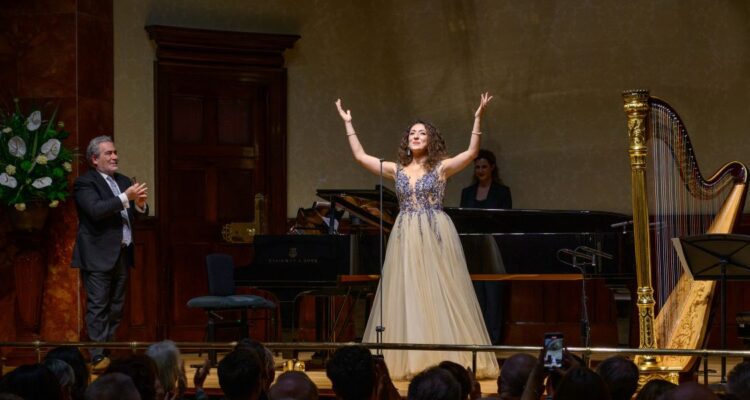Opera Rara won the award for ‘best record label’ at the last Gramophone awards, and on the strength of this latest concert in their Donizetti Song series you can see why. This series headlines top-notch singers in barely known, newly researched repertory, with programmes that are carefully balanced and curated, available live-streamed as well as in person, and accompanied by detailed, absorbing background brochures presented as an online link. Traditional scholarship and musical values are immaculately twinned with efficient modern presentation.
In this instalment there was perhaps less Donizetti than before, but the other composers and works represented were all equally deserving of revival and entirely earned their place in the batting order. Presenting these materials was soprano Rosa Feola, feted as an accomplished operatic and concert performer for over a decade now, and Carlo Rizzi, Opera Rara‘s Artistic Director. For two items they were joined by distinguished harpist, Sally Pryce, best known for her work with the Aurora Orchestra and the Sinfonia of London.
The first five songs all stemmed from Donizetti’s final years in the 1840s. Some of them were occasional pieces, scattered around often as gifts and therefore remaining uncollected; whereas others seem more like self-contained drafts for operatic scenes, character pieces that might be and in fact were opened out finally into theatrical form. All contained the long-breathed melodic lines we all know from the operas, but perhaps more surprising was the variety of harmonic shifts and subtleties of mood to be observed even in the occasional pieces dashed off to satisfy friends.
Having sung several Donizetti roles to acclaim, Rosa Feola is expert in this repertory. She has the technical skill not only to dispatch taxing coloratura, but also the serene confidence to float sustained high notes with variable dynamic intensity. She is also a natural communicator and you hardly needed the texts at all to follow the sense and tone of each song. While the accompaniments are generally undemanding, Rizzi offered able support, giving Feola both leeway and underpinning, as required.
Sally Pryce joined Feola for one song, ‘La Findanzata’, which definitely deserves to be better known, a delicate study of the psychology of romantic betrayal, where the interwoven decoration and ornamentation from both voice and harp was quite ravishing. Pryce then had her own solo Donizetti moment, playing a virtuosic arrangement of Lucia’s Act 1 aria from Lucia di Lammermoor. This was a telling reminder of how important instrumental arrangements were in mediating operatic hits to a broader public and disseminating a composer’s reputation outside the specific space of the theatre.
The rest of the programme focused on Italian song composers writing after Donizetti where traces of bel canto influence can arguably be found. First we heard two versions of a sonnet by Dante, one by Ponchiello and the other by Pinsuti. Both were writing in the generation betwen Verdi and Puccini, and it was fascinating to hear melodies that could have passed for Donizetti wreathed in much more complex harmonic language. Pinsuti’s seemed more original and effective, giving Feola fine opportunities to spin intricate and expressive threads inspired by the theme of feminine beauty.
The final group of four songs, written by Respighi in 1915, sounded more like Ravel or Debussy than anything in the Italian tradition, but were well worth hearing in their own right. These ‘Four Tuscan Stanzas’ took folk poems written in local dialect that offered distilled descriptive operatic moments of memorable power. Feola and Rizzi (the latter with much more demanding part to play here) delivered these songs with almost painterly skill, particularly the third, a quicksilver description of how a message of love might travel on the breeze, and the fourth, a more earthy account of how a lover needs to speak up rather than simply admiring from a distance.
For the encore we returned to opera itself with a scintillating account of Norina’s showpiece aria from the first act of Don Pasquale. Feola owns this role, and she rightly received a bouquet of ‘bravas’ at the end of this continuously stylish and impeccably delivered recital.
There is an important case developing through these concerts devoted to Donizetti and his legacy which suggests we ought to be looking more carefully beyond and behind Italian Opera at the longer story of Italian song in its own right through the nineteenth and twentieth centuries. This voyage of discovery is a theme that is worthy of the future attention of the Oxford International Song Festival, Opera in Song and other long-form celebrations of European song repertory.
Performers: Rosa Feola, Sally Pryce, Carlo Rizzi
2 November 2024
1 hr, live and streamed, no interval
Photo Credit: Simon Weir

